Unit 3 Could you please tell me where the restrooms are-Section B 1a-1e课件(共55张PPT)
文档属性
| 名称 | Unit 3 Could you please tell me where the restrooms are-Section B 1a-1e课件(共55张PPT) | 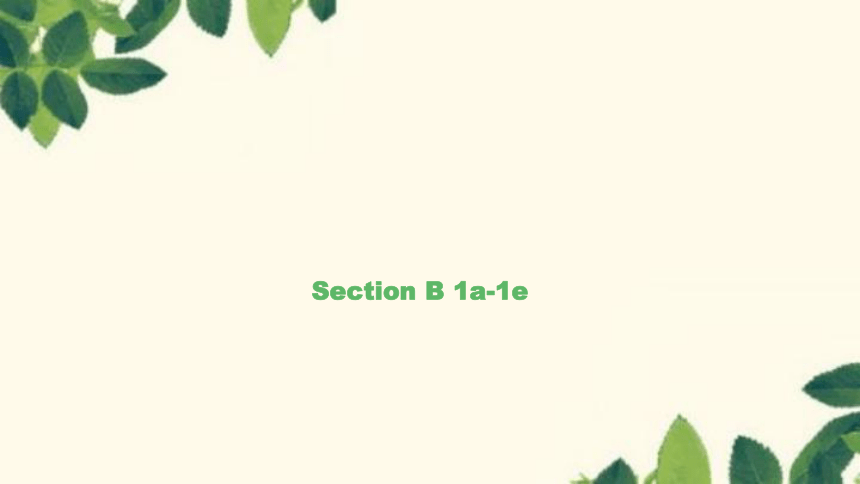 | |
| 格式 | ppt | ||
| 文件大小 | 3.5MB | ||
| 资源类型 | 教案 | ||
| 版本资源 | 人教新目标(Go for it)版 | ||
| 科目 | 英语 | ||
| 更新时间 | 2022-09-13 16:17:48 | ||
图片预览

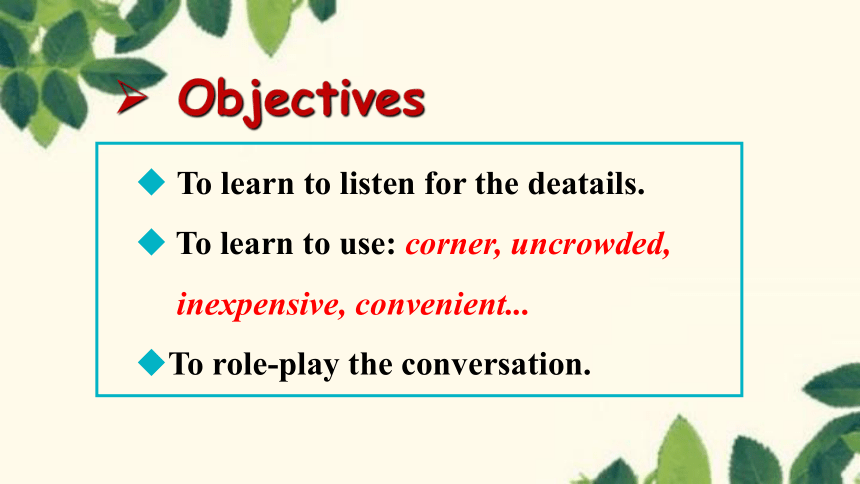
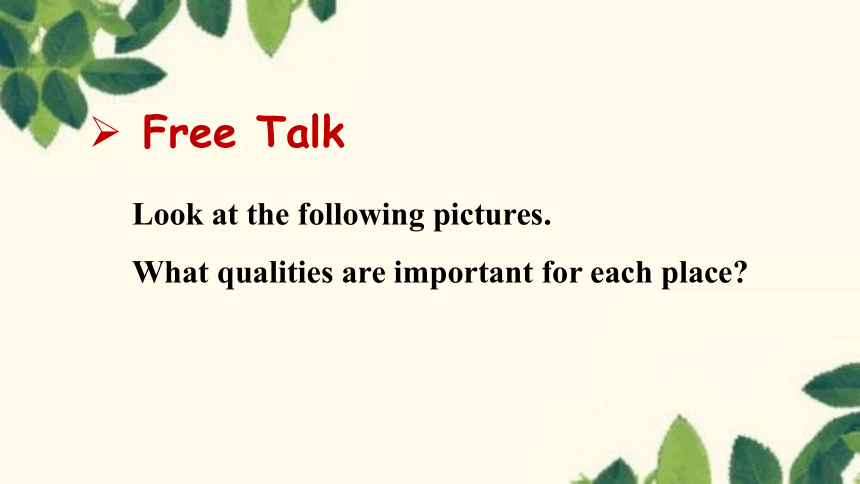
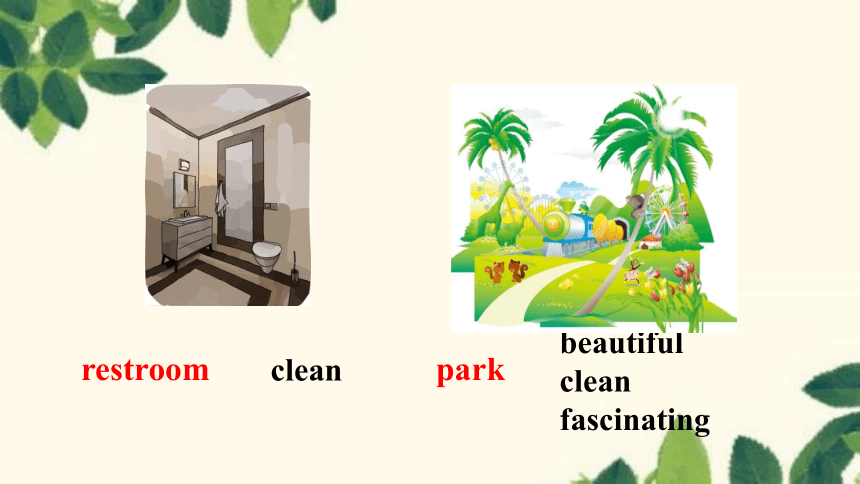
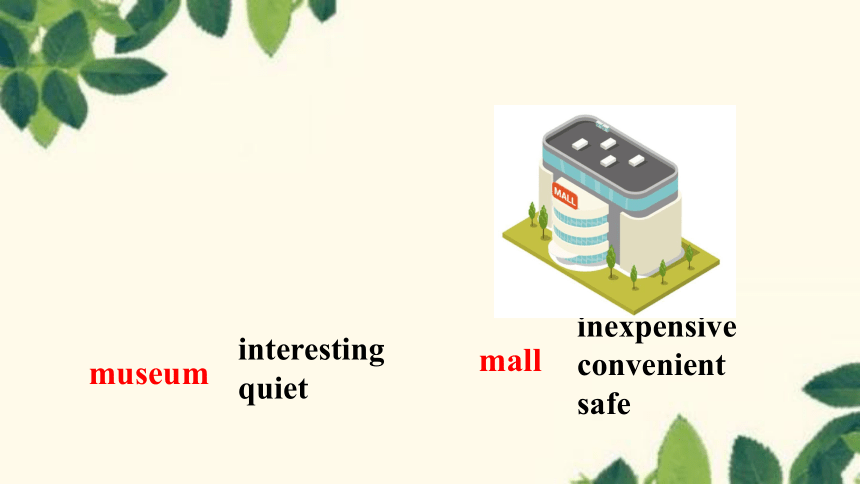
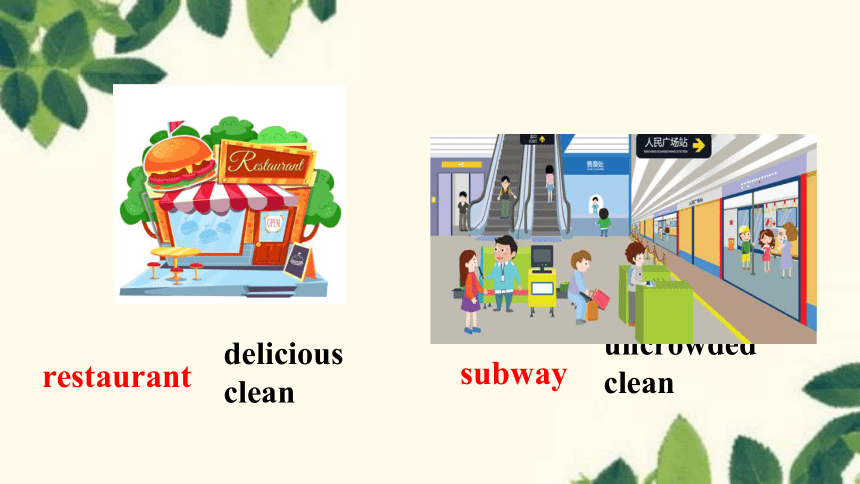
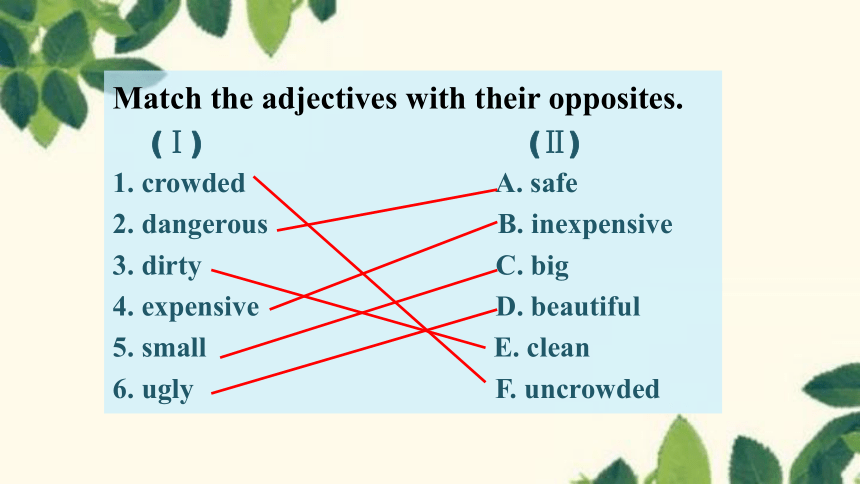
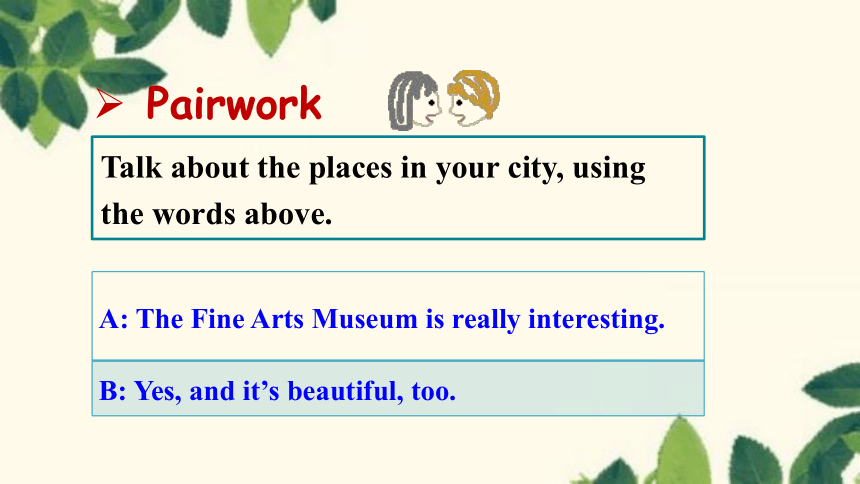
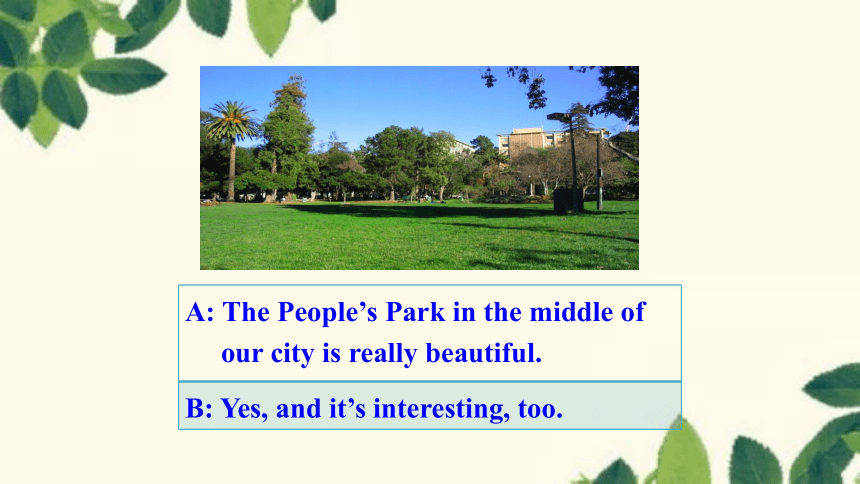
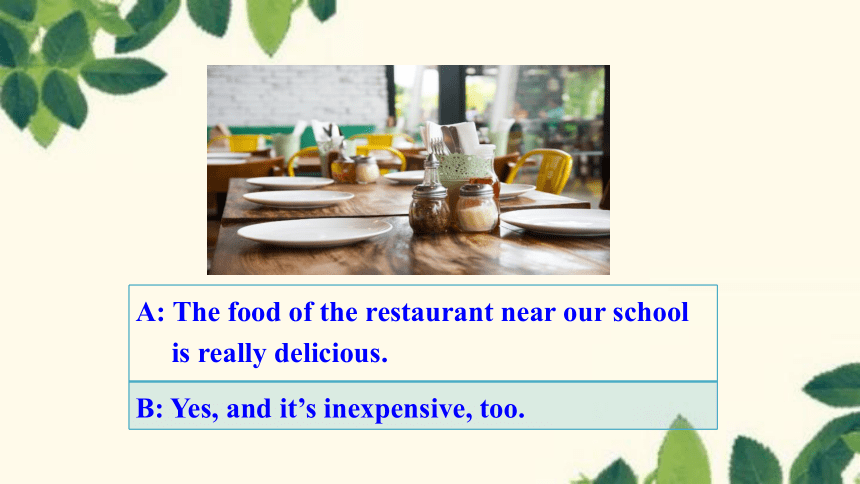
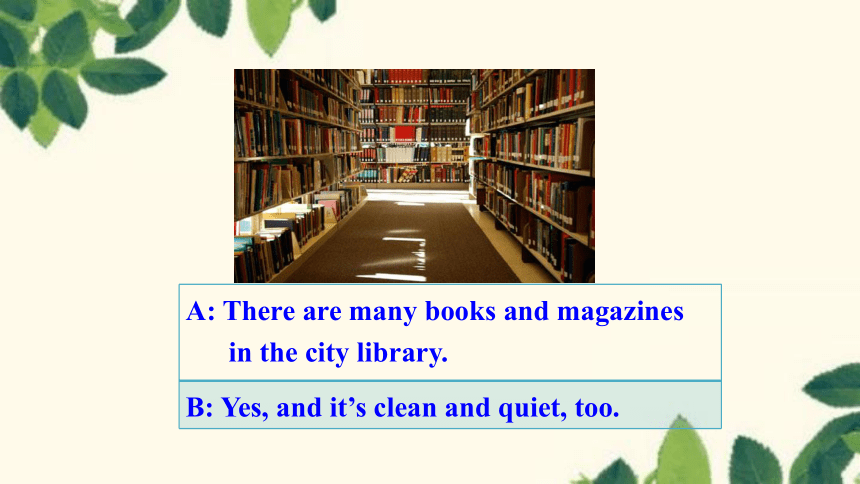

文档简介
(共53张PPT)
Section B 1a-1e
Objectives
To learn to listen for the deatails.
To learn to use: corner, uncrowded,
inexpensive, convenient...
To role-play the conversation.
Look at the following pictures.
What qualities are important for each place
Free Talk
restroom
clean
park
beautiful
clean
fascinating
museum
interesting
quiet
inexpensive
convenient
safe
mall
restaurant
delicious
clean
uncrowded
clean
subway
Match the adjectives with their opposites.
(Ⅰ) (Ⅱ)
1. crowded A. safe
2. dangerous B. inexpensive
3. dirty C. big
4. expensive D. beautiful
5. small E. clean
6. ugly F. uncrowded
Talk about the places in your city, using the words above.
A: The Fine Arts Museum is really interesting.
B: Yes, and it’s beautiful, too.
Pairwork
A: The People’s Park in the middle of
our city is really beautiful.
B: Yes, and it’s interesting, too.
A: The food of the restaurant near our school
is really delicious.
B: Yes, and it’s inexpensive, too.
A: There are many books and magazines
in the city library.
B: Yes, and it’s clean and quiet, too.
1a What qualities are important for each place
Write the words from the box next to each
place below. Write the most important words first.
interesting fascinating inexpensive
quiet uncrowded big beautiful convenient safe clean
fascinating
clean
interesting
convenient
big
1b Talk about places in your city using the
words in 1a.
A: The Fine Arts Museum is really interesting.
B: Yes, and it’s beautiful, too.
1c Listen to the conversations and complete
the sentences.
Conversation 1
The boy asks about _________________ , and the clerk tells him to go to Green Land.
Conversation 2
The girl asks about ________________ , and the clerk tells her to go to the corner of Market and Middle Streets.
a good place to eat
public restrooms
Conversation 3
The mother asks about _______________. The father wants to go to a _________museum. The younger girl wants to go to a ________museum . The boy wants to go to a ____________museum. The older girl wants to go to an______ museum .
The clerk suggests they go to the ___________museum .
a good museum
history
science
children’s
art
computer
Listen to the conversations and complete it.
Boy: Could you tell me where is a good place to eat
Clerk: Of course. There are a lot of good restaurants in Sunville. What kind of food are you looking for
Boy: I'd like ________ ___________.
Clerk: I'd try Green Land. They have delicious salads.
fresh vegetables
Listen to the conversations and complete it.
Girl: Do you know if there are any public restrooms around here
Clerk: Yes. You'd find some at the_________ of ___________ and __________ Streets.
Girl: Umm...are they clean
Clerk: Oh, yes. They are very clean.
corner
Market
Middle
person ideas
The father History museum is _______________
Girl 1 History museum is _______________
Boy We _________go to science museum
Girl 2 I'm too ________ for a children's museum.
The clerk
There are a lot of _______ in the computer
museum.
Listen to the conversations and complete it.
fascinating
boring
always
old
fun
1d Listen again. Check your answers in 1c.
1e Role-play the conversations between the
clerk and the tourists.
A: Can you tell me where there’s a good place to eat
B: Of course. What kind of food do you like
A: ...
Pairwork
A: Could you please tell me where ...
B:...
1. inexpensive 不昂贵的,便宜的
inexpensive形容词,意为“不昂贵的”,其同义词为 cheap,反义词为 expensive/dear。
inexpensive是由expensive加上否定前缀in-构成的。
The sweater is inexpensive.这件毛衣不贵。
Language Points
① dis-表示“不;非;相反”,如:
like喜欢 — dislike 不喜欢;
agree 同意 — disagree 不同意。
② in-(im-,ir-)表示“不;非”,如:
expensive 昂贵的 — inexpensive便宜的;
polite礼貌的 — impolite不礼貌的;
regular有规律的 — irregular无规律的。
③un-表示“不,非”,如:
able有能力的 — unable无能力的;
like像 — unlike不像;
crowded拥挤的 — uncrowded不拥挤的;
陈述句中如果有带否定前缀或后缀的单词, 整个句子仍被视为肯定句,反意疑问部分用否定形式。
She is unhappy, isn’t she 她不高兴,是吗?
注意
2. convenient 便利的;方便的
convenient形容词,意为“便利的;方便的”,其主语
不能是表示人的词,常用于句型:
It’s convenient for sb. to do sth.
意为“对于某人来说做某事是方便的”。
It’s convenient for us to start working right now.
我们立刻开始工作是方便的。
convenience是convenient的名词形式,既可作可数名词,意为“便利的设施”,也可作不可数名词,意为“方便,便利”。
The house has all the modern convenience.
这所房子配有各种现代化便利设旅。
I keep my books near my desk for convenience.
为了方便,我把书放在书桌旁。
3. …and the clerk tells her to go to the corner of Market and Middle.
……工作人员告诉她去市场大街和中心大街交汇的拐角处。
corner是可数名词,意为“拐角;角落”。
常构成短语:
①in the corner of...意为“在……的拐角处/角落里”
I found a bird flying in the sky.
我发现一个男孩在房间的角落里哭。
②on/at the corner 意为“在拐角处”
The shop is on the corner.
那家商店在拐角处。
Ⅰ. 根据首字母和汉语提示完成下列单词。
1. There are few people in the supermarket, so it's __________ (不拥挤的).
2. The clerk tells her to go to the (角落)
of Market and Middle Streets
3. I s having dinner at Green Restaurant.
lt serves delicious food.
uncrowded
corner
uggest
Exercises
Ⅱ.请根据汉语意思完成下列英语句子(每空一词)。
对他来说,回答那个问题是十分困难的。
It’s very hard ____ him ____ _______ that question.
2.—你能告诉我哪里有吃饭的好地方吗?
—当然可以。
— Can you tell me _______ ______ a good place _______ _____
— Of course.
for
to answer
where there's
to eat
3. 我们在阅览室里保持安静是十分必要的。
It’s necessary ______ ___ _____ keep
quiet in the reading room.
It’s necessary for us ___ ______ ______ in
the reading room.
that we should
to keep quiet
Listen to the listening materials again and read after them.
Homework
To listen to 1c and 1d, then complete them.
To learn new words: pronounce, increase, speed, partner…
Objectives
Do you have difficulties in learning English
What things are difficult for you
Discussion
What’s your problem in learning English How do you solve them
I have difficulties in
learning English.
Can you help me
The difficulties he has in learning English.
New words: can’t pronounce some of the words
spell some English words
Speaking: be afraid to speak
Listening: can’t understand spoken English
Writing: can’t make complete sentences
Reading: read very slowly
Grammar: make mistakes
1a Learning English can be difficult. What things are
difficult for you Read the list. Check ( ) the
statements that are true for you.
____ I can’t pronounce some of the words.(v. 发音)
____ I can’t always understand spoken English.
____ I don’t know how to increase my reading speed.
____ I can’t spell some English words.
____ I often make mistakes in grammar.
(v. 增加;增长)
(n. 速度)
1b What other things are difficult for you
Make a list.
1. I don’t know enough words to write well.
2. ________________________________
3. ________________________________
4. ______________________________
5. ________________________________
can’t get the pronunciation right
be afraid people might laugh at me
forget a lot of new words
don’t get much writing practice
1c Paul finds it difficult to learn English. Listen and
complete the learning challenges he talks about.
1. He can’t get the__________________ right.
2. He___________ a lot of new words.
3. He can’t always_____________ when people talk to him.
4. He doesn’t get much___________ practice.
pronunciation
forgets
understand
writing
Challenges
1d Listen again. Complete the solutions.
1. ________________ can help.
He can always_____________________ in his notebook and study them at home.
He can_____________________________ to practice speaking.
He should find a _______ to practice writing.
Listening
write the new words
join an English language club
pen pal
Solutions
1e Role-play conversations using the information
in 1c and 1d.
① A: I don’t have a partner to practice English with.
B: Maybe you should join an English club.
② A: I always forget the new words.
B: You can write the new words in your notebook
and study them at home.
A: I can’t always understand when people talk to me.
B: Maybe you should join an English language club
to practice speaking.
A: I forget a lot of new words.
B: Maybe you should write the new words in your
notebook and study them at home.
Pair work
1.I often make mistakes in grammar.
mistake n. 错误;过失 make mistakes 犯错
Tom didn’t make a single spelling mistake in his composition. 汤姆在这篇作文里一个字也没拼错。
mistake vt. 弄错,误解
I mistook the number and went to the wrong room. 我记错号码, 走错了房间。
Language points
2. challenge n. 挑战
He wants a career that offers a challenge. 他想要一份有挑战性的事业。
vt. 向……挑战;对……提出异议
I challenged him to show his proof. 我要他拿出证据。
He challenged my view on that matter. 他就我对那件事的看法提出异议。
3. solution n. (问题、疑难等的) 解决;解答
It may take a long time to find a solution to the problem. 也许要花很长时间才能找到解决这个问题的办法。 The solution of the problem requires a lot of time. 解决这个问题需要很多时间。
4. Maybe you should join an English club.
join/join in/take part in
(1) join=be a member of 参加, 指加入某种组织,并成为其中的一员。
join the army / party 入伍/党 join the club 加入俱乐部
join in 后接活动名称
join sb. 加入到某个人群之中
Ⅰ. 用所给词的适当形式填空。
1. Sometimes, I can’t get the____________ (pronounce) right.
2. I don’t know how__________ (improve) my spoken English.
3. The more careful you are, the fewer_________ (mistake)
you’ll make.
4. You can find a pen pal to practice________ (write).
5. She can’t______ (spell) English words.
Exercises
pronunciation
to improve
mistakes
writing
spell
Ⅱ. 用方框中所给单词的适当形式填空。
We must learn to face the __________ in our life.
2. He has trouble in understanding _______ English.
3. Can you think of a good _______ to the problem
4. You can listen to the tapes to get much listening _______.
5. The more careful you are, the fewer _______ you’ll make.
solution, practice, mistake, spoken, challenges
challenges
spoken
solution
practice
mistakes
— Excuse me, can you teach me how to ______
this new word
— No problem. Look at my mouth and listen
carefully.
A. prove B. pronounce
C. prepare D. produce
B
中考链接
证明
准备
发音
生产
你能教给我这个新词怎么样……
— Miss Huang always advises us to practice
speaking English after class.
— She is right. Speaking is an important
language __________.
A. sign B. skill C. suggestion
符号
技能
建议
B
Review the new words and expressions you’ve learned today.
Preview the article How Can You Become a Successful Learner on page 6.
Homework
Section B 1a-1e
Objectives
To learn to listen for the deatails.
To learn to use: corner, uncrowded,
inexpensive, convenient...
To role-play the conversation.
Look at the following pictures.
What qualities are important for each place
Free Talk
restroom
clean
park
beautiful
clean
fascinating
museum
interesting
quiet
inexpensive
convenient
safe
mall
restaurant
delicious
clean
uncrowded
clean
subway
Match the adjectives with their opposites.
(Ⅰ) (Ⅱ)
1. crowded A. safe
2. dangerous B. inexpensive
3. dirty C. big
4. expensive D. beautiful
5. small E. clean
6. ugly F. uncrowded
Talk about the places in your city, using the words above.
A: The Fine Arts Museum is really interesting.
B: Yes, and it’s beautiful, too.
Pairwork
A: The People’s Park in the middle of
our city is really beautiful.
B: Yes, and it’s interesting, too.
A: The food of the restaurant near our school
is really delicious.
B: Yes, and it’s inexpensive, too.
A: There are many books and magazines
in the city library.
B: Yes, and it’s clean and quiet, too.
1a What qualities are important for each place
Write the words from the box next to each
place below. Write the most important words first.
interesting fascinating inexpensive
quiet uncrowded big beautiful convenient safe clean
fascinating
clean
interesting
convenient
big
1b Talk about places in your city using the
words in 1a.
A: The Fine Arts Museum is really interesting.
B: Yes, and it’s beautiful, too.
1c Listen to the conversations and complete
the sentences.
Conversation 1
The boy asks about _________________ , and the clerk tells him to go to Green Land.
Conversation 2
The girl asks about ________________ , and the clerk tells her to go to the corner of Market and Middle Streets.
a good place to eat
public restrooms
Conversation 3
The mother asks about _______________. The father wants to go to a _________museum. The younger girl wants to go to a ________museum . The boy wants to go to a ____________museum. The older girl wants to go to an______ museum .
The clerk suggests they go to the ___________museum .
a good museum
history
science
children’s
art
computer
Listen to the conversations and complete it.
Boy: Could you tell me where is a good place to eat
Clerk: Of course. There are a lot of good restaurants in Sunville. What kind of food are you looking for
Boy: I'd like ________ ___________.
Clerk: I'd try Green Land. They have delicious salads.
fresh vegetables
Listen to the conversations and complete it.
Girl: Do you know if there are any public restrooms around here
Clerk: Yes. You'd find some at the_________ of ___________ and __________ Streets.
Girl: Umm...are they clean
Clerk: Oh, yes. They are very clean.
corner
Market
Middle
person ideas
The father History museum is _______________
Girl 1 History museum is _______________
Boy We _________go to science museum
Girl 2 I'm too ________ for a children's museum.
The clerk
There are a lot of _______ in the computer
museum.
Listen to the conversations and complete it.
fascinating
boring
always
old
fun
1d Listen again. Check your answers in 1c.
1e Role-play the conversations between the
clerk and the tourists.
A: Can you tell me where there’s a good place to eat
B: Of course. What kind of food do you like
A: ...
Pairwork
A: Could you please tell me where ...
B:...
1. inexpensive 不昂贵的,便宜的
inexpensive形容词,意为“不昂贵的”,其同义词为 cheap,反义词为 expensive/dear。
inexpensive是由expensive加上否定前缀in-构成的。
The sweater is inexpensive.这件毛衣不贵。
Language Points
① dis-表示“不;非;相反”,如:
like喜欢 — dislike 不喜欢;
agree 同意 — disagree 不同意。
② in-(im-,ir-)表示“不;非”,如:
expensive 昂贵的 — inexpensive便宜的;
polite礼貌的 — impolite不礼貌的;
regular有规律的 — irregular无规律的。
③un-表示“不,非”,如:
able有能力的 — unable无能力的;
like像 — unlike不像;
crowded拥挤的 — uncrowded不拥挤的;
陈述句中如果有带否定前缀或后缀的单词, 整个句子仍被视为肯定句,反意疑问部分用否定形式。
She is unhappy, isn’t she 她不高兴,是吗?
注意
2. convenient 便利的;方便的
convenient形容词,意为“便利的;方便的”,其主语
不能是表示人的词,常用于句型:
It’s convenient for sb. to do sth.
意为“对于某人来说做某事是方便的”。
It’s convenient for us to start working right now.
我们立刻开始工作是方便的。
convenience是convenient的名词形式,既可作可数名词,意为“便利的设施”,也可作不可数名词,意为“方便,便利”。
The house has all the modern convenience.
这所房子配有各种现代化便利设旅。
I keep my books near my desk for convenience.
为了方便,我把书放在书桌旁。
3. …and the clerk tells her to go to the corner of Market and Middle.
……工作人员告诉她去市场大街和中心大街交汇的拐角处。
corner是可数名词,意为“拐角;角落”。
常构成短语:
①in the corner of...意为“在……的拐角处/角落里”
I found a bird flying in the sky.
我发现一个男孩在房间的角落里哭。
②on/at the corner 意为“在拐角处”
The shop is on the corner.
那家商店在拐角处。
Ⅰ. 根据首字母和汉语提示完成下列单词。
1. There are few people in the supermarket, so it's __________ (不拥挤的).
2. The clerk tells her to go to the (角落)
of Market and Middle Streets
3. I s having dinner at Green Restaurant.
lt serves delicious food.
uncrowded
corner
uggest
Exercises
Ⅱ.请根据汉语意思完成下列英语句子(每空一词)。
对他来说,回答那个问题是十分困难的。
It’s very hard ____ him ____ _______ that question.
2.—你能告诉我哪里有吃饭的好地方吗?
—当然可以。
— Can you tell me _______ ______ a good place _______ _____
— Of course.
for
to answer
where there's
to eat
3. 我们在阅览室里保持安静是十分必要的。
It’s necessary ______ ___ _____ keep
quiet in the reading room.
It’s necessary for us ___ ______ ______ in
the reading room.
that we should
to keep quiet
Listen to the listening materials again and read after them.
Homework
To listen to 1c and 1d, then complete them.
To learn new words: pronounce, increase, speed, partner…
Objectives
Do you have difficulties in learning English
What things are difficult for you
Discussion
What’s your problem in learning English How do you solve them
I have difficulties in
learning English.
Can you help me
The difficulties he has in learning English.
New words: can’t pronounce some of the words
spell some English words
Speaking: be afraid to speak
Listening: can’t understand spoken English
Writing: can’t make complete sentences
Reading: read very slowly
Grammar: make mistakes
1a Learning English can be difficult. What things are
difficult for you Read the list. Check ( ) the
statements that are true for you.
____ I can’t pronounce some of the words.(v. 发音)
____ I can’t always understand spoken English.
____ I don’t know how to increase my reading speed.
____ I can’t spell some English words.
____ I often make mistakes in grammar.
(v. 增加;增长)
(n. 速度)
1b What other things are difficult for you
Make a list.
1. I don’t know enough words to write well.
2. ________________________________
3. ________________________________
4. ______________________________
5. ________________________________
can’t get the pronunciation right
be afraid people might laugh at me
forget a lot of new words
don’t get much writing practice
1c Paul finds it difficult to learn English. Listen and
complete the learning challenges he talks about.
1. He can’t get the__________________ right.
2. He___________ a lot of new words.
3. He can’t always_____________ when people talk to him.
4. He doesn’t get much___________ practice.
pronunciation
forgets
understand
writing
Challenges
1d Listen again. Complete the solutions.
1. ________________ can help.
He can always_____________________ in his notebook and study them at home.
He can_____________________________ to practice speaking.
He should find a _______ to practice writing.
Listening
write the new words
join an English language club
pen pal
Solutions
1e Role-play conversations using the information
in 1c and 1d.
① A: I don’t have a partner to practice English with.
B: Maybe you should join an English club.
② A: I always forget the new words.
B: You can write the new words in your notebook
and study them at home.
A: I can’t always understand when people talk to me.
B: Maybe you should join an English language club
to practice speaking.
A: I forget a lot of new words.
B: Maybe you should write the new words in your
notebook and study them at home.
Pair work
1.I often make mistakes in grammar.
mistake n. 错误;过失 make mistakes 犯错
Tom didn’t make a single spelling mistake in his composition. 汤姆在这篇作文里一个字也没拼错。
mistake vt. 弄错,误解
I mistook the number and went to the wrong room. 我记错号码, 走错了房间。
Language points
2. challenge n. 挑战
He wants a career that offers a challenge. 他想要一份有挑战性的事业。
vt. 向……挑战;对……提出异议
I challenged him to show his proof. 我要他拿出证据。
He challenged my view on that matter. 他就我对那件事的看法提出异议。
3. solution n. (问题、疑难等的) 解决;解答
It may take a long time to find a solution to the problem. 也许要花很长时间才能找到解决这个问题的办法。 The solution of the problem requires a lot of time. 解决这个问题需要很多时间。
4. Maybe you should join an English club.
join/join in/take part in
(1) join=be a member of 参加, 指加入某种组织,并成为其中的一员。
join the army / party 入伍/党 join the club 加入俱乐部
join in 后接活动名称
join sb. 加入到某个人群之中
Ⅰ. 用所给词的适当形式填空。
1. Sometimes, I can’t get the____________ (pronounce) right.
2. I don’t know how__________ (improve) my spoken English.
3. The more careful you are, the fewer_________ (mistake)
you’ll make.
4. You can find a pen pal to practice________ (write).
5. She can’t______ (spell) English words.
Exercises
pronunciation
to improve
mistakes
writing
spell
Ⅱ. 用方框中所给单词的适当形式填空。
We must learn to face the __________ in our life.
2. He has trouble in understanding _______ English.
3. Can you think of a good _______ to the problem
4. You can listen to the tapes to get much listening _______.
5. The more careful you are, the fewer _______ you’ll make.
solution, practice, mistake, spoken, challenges
challenges
spoken
solution
practice
mistakes
— Excuse me, can you teach me how to ______
this new word
— No problem. Look at my mouth and listen
carefully.
A. prove B. pronounce
C. prepare D. produce
B
中考链接
证明
准备
发音
生产
你能教给我这个新词怎么样……
— Miss Huang always advises us to practice
speaking English after class.
— She is right. Speaking is an important
language __________.
A. sign B. skill C. suggestion
符号
技能
建议
B
Review the new words and expressions you’ve learned today.
Preview the article How Can You Become a Successful Learner on page 6.
Homework
同课章节目录
- Unit 1 How can we become good learners.
- Section A
- Section B
- Unit 2 I think that mooncakes are delicious!
- Section A
- Section B
- Unit 3 Could you please tell me where the restroom
- Section A
- Section B
- Unit 4 I used to be afraid of the dark.
- Section A
- Section B
- Unit 5 What are the shirts made of?
- Section A
- Section B
- Review of Units 1-5
- Unit 6 When was it invented?
- Section A
- Section B
- Unit 7 Teenagers should be allowed to choose their
- Section A
- Section B
- Unit 8 It must belong to Carla.
- Section A
- Section B
- Unit 9 I like music that I can dance to.
- Section A
- Section B
- Unit 10 You're supposed to shake hands.
- Section A
- Section B
- Review of Units 6-10
- Unit 11 Sad movies make me cry.
- Section A
- Section B
- Unit 12 Life is full of the unexpected
- Section A
- Section B
- Unit 13 We're trying to save the earth!
- Section A
- Section B
- Unit 14 I remember meeting all of you in Grade 7.
- Section A
- Section B
- Review of Units 11-14
